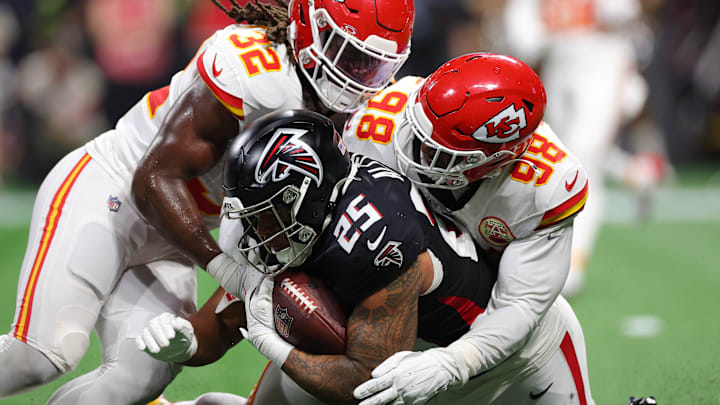It is no secret that flags usually favor the Kansas City Chiefs in the NFL world. We have often seen suspect calls bail out the Chiefs in crucial situations, which certainly happened again against the Atlanta Falcons.
In a critical spot, Kirk Cousins threw a pass to Kyle Pitts in the endzone with a defender in the way. Pitts attempted to fight back to the ball while the defender did not attempt to turn his head (the same type of foul that got the Rams in field goal range to beat the 49ers earlier in the day). It was clear pass interference with the referee standing right there but no flag was thrown.
It is easy to focus on that singular play but there was more to the story for the refs than just the yellow flag. There were countless times when the Chiefs were given a first down or the Falcons were called short when the opposite was true.
Spotting of the ball cost the Atlanta Falcons a win in Week 3
The simple process of spotting a ball often gets overlooked during an NFL game. It is a crucial part of any game that can completely change a game, which we saw firsthand on Sunday Night Football.
I cannot count how many times where the Chiefs were marked past the line to gain when they were obviously short. And on the flipside, the Falcons never got the benefit of the doubt or even the benefit of the clear and obvious.
Ironically, the two biggest blunders happened at the beginning and end of the game. In a fourth-and-short, the Chiefs were stuffed short of the line. However, the line judge called it a first down which prompted Raheem Morris to throw the challenge flag.
With a camera angle down the line and a clear mark across the field of where the first down was, the ball was short, no doubt about it. Well, replay let the original spot slide which eventually turned into Justin Simmons' interception.
It may not seem like a big deal considering how the drive ended for KC but that was about 30 yards of field position. Kirk Cousins would've had the ball at midfield rather than his own 20.
The second example came on the final drive for the Falcons. Tyler Allgeier took the ball on third down and was initially stuffed but he fought his way for what appeared to be a first down. He left the ball where he was down but the ref ran in and grabbed the ball to move it back a significant distance. We all know what happened after that...
There were countless other examples sandwiched between those game-altering instances. Something as simple as that likely cost the Falcons the game.
While the fourth-down play call was horrendous, the game shouldn't have come down to that play. The Falcons need to move forward knowing they hung in against two forces pushing against them.
